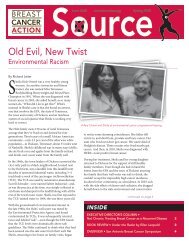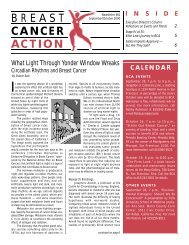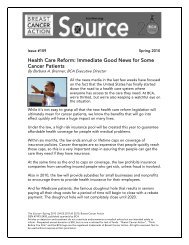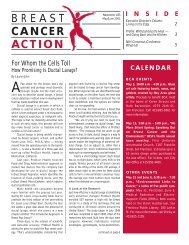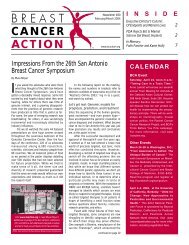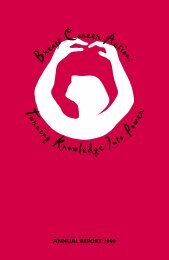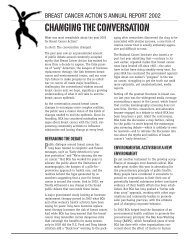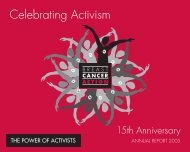BREAST CANCER ACTION - Return to Home Page - Breast Cancer ...
BREAST CANCER ACTION - Return to Home Page - Breast Cancer ...
BREAST CANCER ACTION - Return to Home Page - Breast Cancer ...
You also want an ePaper? Increase the reach of your titles
YUMPU automatically turns print PDFs into web optimized ePapers that Google loves.
2 June/July 2006 <strong>Breast</strong> <strong>Cancer</strong> Action<br />
FROM THE EXECUTIVE DIRECTOR<br />
Facing the Challenges: Access <strong>to</strong> Screening and Treatment<br />
By Barbara A. Brenner<br />
The following is a talk presented at the San Francisco <strong>Breast</strong> <strong>Cancer</strong><br />
Summit in November 1996 and published in the February/March 1997<br />
issue of this newsletter. A decade after Barbara Brenner presented this<br />
talk, accessing care is still a dire issue for many women with breast cancer<br />
and the public at large. This issue of the newsletter explores some of the<br />
problems and some of the ways people are working for change.<br />
As a white, upper middle-class Jewish lesbian with breast<br />
cancer, I know that I have been privileged <strong>to</strong> receive<br />
treatment in a city whose resources—both private and<br />
public—are phenomenal. In the years before my diagnosis, I had<br />
access <strong>to</strong> mammograms, clinical breast exams, and diagnostic<br />
procedures when I needed them. I had<br />
access not only because I knew where and<br />
how <strong>to</strong> get them, but also because the cost<br />
was covered largely by insurance.<br />
Since September 1993, I have been<br />
treated twice for breast cancer in San<br />
Francisco. I want <strong>to</strong> talk <strong>to</strong>day about the<br />
care I received. I believe my experience is<br />
instructive because it reveals both what is<br />
possible and what the challenges are for<br />
making sure that all women get the<br />
services they need when confronting a<br />
possible or actual breast cancer diagnosis.<br />
In January 1993, at the age of 41 I<br />
had a screening mammogram. I chose <strong>to</strong><br />
have the mammogram at UCSF, but, under<br />
my insurance plan, I could have had the<br />
procedure almost anywhere in the city. My mammogram showed the<br />
dense breast tissue that is not uncommon in premenopausal women.<br />
I knew about this phenomenon and did not rely on the<br />
mammogram. I had learned years before about breast self-exams, and<br />
I was not afraid of or embarrassed by my body, so I did monthly<br />
exams.<br />
In August 1993 in the course of my breast self-exam, I found a<br />
lump. I picked up the phone, called my surgeon (I had someone I<br />
had seen previously,) and got an appointment <strong>to</strong> see him. The fine<br />
needle aspiration proved inconclusive, so we scheduled an excisional<br />
biopsy. The lump turned out <strong>to</strong> be invasive ductal breast cancer.<br />
Let’s s<strong>to</strong>p here a minute and imagine a few things differently. Let’s<br />
imagine that I did not have insurance, or had a high-deductible policy and<br />
“As stressful as it is <strong>to</strong><br />
deal with a diagnosis of breast<br />
cancer, that stress<br />
is often swamped by the<br />
pressures of putting food<br />
on the table and keeping<br />
a roof over the kids’ heads, let<br />
alone our own heads.”<br />
would have <strong>to</strong> pay for a mammogram out of my own pocket, or that I was<br />
someone who didn’t know the first thing about mammograms—what they<br />
were, their benefits and risks, or how <strong>to</strong> get one. Or that the cultural norms<br />
with which I was raised made it shameful or sinful <strong>to</strong> <strong>to</strong>uch my breasts. Or<br />
that I was an undocumented woman who was afraid <strong>to</strong> seek health care<br />
because I was concerned that immigration authorities would find out about<br />
me. Or that I was a legal immigrant concerned about the rabid atmosphere<br />
surrounding people with Spanish surnames who was afraid <strong>to</strong> seek health<br />
care because I didn’t trust that anyone would take the time <strong>to</strong> distinguish<br />
me from undocumented people. As a result, I might stand before you<br />
<strong>to</strong>day—three years later—with advanced disease. Or I might not be<br />
standing before you at all because my breast cancer was diagnosed <strong>to</strong>o late<br />
<strong>to</strong> be treated effectively…<br />
Once I was diagnosed, the first thing I<br />
did was arrange <strong>to</strong> s<strong>to</strong>p practicing law for<br />
as long as necessary <strong>to</strong> address the lifethreatening<br />
illness that had intruded in<strong>to</strong><br />
my life. My ability <strong>to</strong> do that was entirely a<br />
function of a supportive work and family<br />
environment, and income security in the<br />
form of income disability insurance coverage.<br />
I had a loving partner of 18 years<br />
who earned a decent income, a house we<br />
owned in Noe Valley, a health insurance<br />
plan—paid for by my law firm—that gave<br />
me many options in terms of which doc<strong>to</strong>rs<br />
I saw and where I received treatment. I also<br />
had an extensive network of friends and<br />
acquaintances who were familiar with<br />
health care issues in general and breast cancer in particular, and who,<br />
by the way, knew how <strong>to</strong> cook.<br />
How would my situation have been different if I had had small<br />
children and no partner, or if I had had a minimum wage job and no<br />
income security, or, as is <strong>to</strong>o often the case, all of the above? As stressful as<br />
it is <strong>to</strong> deal with a diagnosis of breast cancer, that stress is often swamped<br />
by the pressures of putting food on the table and keeping a roof over the<br />
kids’ heads, let alone our own heads. We fool ourselves badly if we pretend<br />
that addressing issues of access <strong>to</strong> treatment does not involve addressing<br />
issues of basic human needs.<br />
Let’s go back <strong>to</strong> my s<strong>to</strong>ry. After I <strong>to</strong>ok care of my work obligations,<br />
I started gathering as much information as I possibly could. I<br />
continued on page 6<br />
TURN IN YOUR DOCTOR!<br />
If you think your health care providers should be reading the BCA Newsletter, let us know!<br />
Just send their names and addresses (including e-mail, if available) <strong>to</strong><br />
sharding@bcaction.org, or call us <strong>to</strong>ll free at 877/278-6722.



